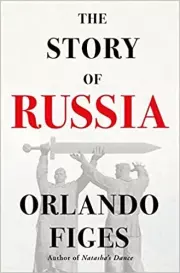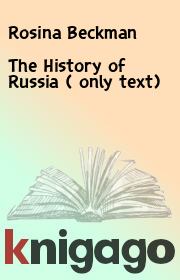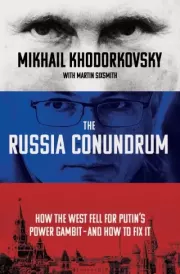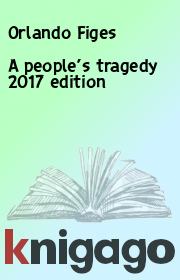Orlando Figes - The Story of Russia
 | Название: | The Story of Russia |
Автор: | Orlando Figes | |
Жанр: | Старинная литература | |
Изадано в серии: | неизвестно | |
Издательство: | неизвестно | |
Год издания: | 2022 | |
ISBN: | неизвестно | |
Отзывы: | Комментировать | |
Рейтинг: | ||
Поделись книгой с друзьями! Помощь сайту: донат на оплату сервера | ||
Краткое содержание книги "The Story of Russia"
“This is the essential backstory, the history book that you need if you want to understand modern Russia and its wars with Ukraine, with its neighbors, with America, and with the West.”
―Anne Applebaum, author of Twilight of Democracy and Red Famine
Named a Most Anticipated Book of the Year by Publishers Weekly and Kirkus Reviews
From “the great storyteller of Russian history” (Financial Times), a brilliant account of the national mythologies and imperial ideologies that have shaped Russia’s past and politics―essential reading for understanding the country today
The Story of Russia is a fresh approach to the thousand years of Russia’s history, concerned as much with the ideas that have shaped how Russians think about their past as it is with the events and personalities comprising it. No other country has reimagined its own story so often, in a perpetual effort to stay in step with the shifts of ruling ideologies.
From the founding of Kievan Rus in the first millennium to Putin’s war against Ukraine, Orlando Figes explores the ideas that have guided Russia’s actions throughout its long and troubled existence. Whether he's describing the crowning of Ivan the Terrible in a candlelit cathedral or the dramatic upheaval of the peasant revolution, he reveals the impulses, often unappreciated or misunderstood by foreigners, that have driven Russian history: the medieval myth of Mother Russia’s holy mission to the world; the imperial tendency toward autocratic rule; the popular belief in a paternal tsar dispensing truth and justice; the cult of sacrifice rooted in the idea of the “Russian soul”; and always, the nationalist myth of Russia’s unjust treatment by the West.
How the Russians came to tell their story and to revise it so often as they went along is not only a vital aspect of their history; it is also our best means of understanding how the country thinks and acts today. Based on a lifetime of scholarship and enthrallingly written, The Story of Russia is quintessential Figes: sweeping, revelatory, and masterful.
Читаем онлайн "The Story of Russia". [Страница - 3]
- 1
- 2
- 3
- 4
- 5
- . . .
- последняя (101) »
Along with the myths that have shaped Russia’s past, there are a number of recurring themes in The Story of Russia. These themes reflect the structural continuities of Russian history – geographic factors, systems of belief, modes of rule, political ideas and social customs – which remain so important for an informed understanding of Russia today. Contemporary Russian politics are too often analysed without knowledge of the country’s past. To grasp what Putin really means for Russia and the broader world, we need to understand how his governance relates to the long-term patterns of Russian history, and what it means to Russians when he appeals to those ‘traditional values’.
These deep structural continuities will become apparent in my narrative, but it is worth making one or two clear right from the start. The first is the most obvious: Russia’s vast size and geography. Why did Russia grow so big? How was it able to expand so far across Eurasia and incorporate so many different nationalities (194 were recognised by the first Soviet census in 1926)? What was the impact of Russia’s size on the evolution of the Russian state? The eighteenth-century empress Catherine the Great maintained that a country as big as Russia needed to be governed by autocracy: ‘Only swiftness of decision in matters sent from distant realms can compensate for the slowness caused by these great distances. Any other form of government would be not merely harmful, but utterly ruinous for Russia.’10 But did this have to be the case? Were there not other forms of representative or local government that might have taken the place of an autocratic state?
Russia developed on a flat and open territory without natural boundaries. Its position made it vulnerable to foreign invasion but also open to the influence of the surrounding powers – Khazars, Mongols, Byzantines, Europeans and Ottomans – with which its relations were defined by trade. As the Russian state grew stronger, a process we should date from the sixteenth century, its main focus was the defence of its frontiers. This priority involved certain patterns of development that have shaped the country’s history.
It entailed the subordination of society to the state and its military needs. Social classes were created and legally defined to benefit the state as taxpayers and military servitors. It also meant a policy of territorial aggrandisement to secure Russia’s frontiers. From the rise of Muscovy, or Moscow, the founding core of the Russian state, to Putin’s wars in Ukraine, history shows that Russia tends to advance its security by keeping neighbouring countries weak, and by fighting wars beyond its borders to keep hostile powers at arm’s length. Does this mean that Russia is expansionist in character, as so many of its critics in the modern age have said? Or should its tendency to push outwards and colonise the spaces around it be viewed rather as a defensive reaction, stemming from its perceived need for buffer states to protect it on the open steppe?
The nature of state power is the other theme worth mentioning here. Catherine the Great was in the habit of comparing Russia to the European absolutist states. But the Russian state was not like them. It had evolved as a patrimonial or personal autocracy, in which the concept of the state (gosudarstvo) was embodied in the person of the tsar (gosudar) as the sovereign lord or owner of the Russian lands. In medieval Europe the legal separation of the ‘king’s two bodies’ – his mortal person and the sacred office of the monarchy – allowed for the development of an abstract and impersonal conception of the state.11 But that did not happen in Russia. From the reign of Ivan IV, the tsar and state were seen as one – united in the body of a single being, who, as man and ruler, was an instrument of God.
The sacralisation of the tsar’s authority, a legacy of Byzantium, was both a strength and a weakness of the Russian state. The myth of the tsar as a sacred agent was, on the one hand, essential to the cult of the holy tsar that underpinned the monarchy until the twentieth century, when the myth was at last broken by Nicholas II’s repressive measures against popular protests. On the other hand, the same myth could be used by rebel leaders, as it was by the Cossack-led rebellions of the seventeenth and eighteenth centuries, to subvert the tsar’s power. In the popular imagination the holy tsar was the deliverer of truth and social justice (pravda) to the people. But if the tsar brought injustice, he could not be the ‘true tsar’ – he was perhaps the Antichrist sent by Satan to destroy God’s work in the ‘Russian holy land’ – and as such should be opposed. By claiming they were fighting to restore the true tsar to the throne, the Cossack rebel leaders were able to attract a mass following in protest movements that shook the state at crisis moments in its modern history.
Similar ideas of truth and justice would underpin the Russian Revolution of 1917. The myth of the holy tsar would also give way to the leader cults of Lenin and Stalin, whose statues would appear on every square. Putin’s regime draws from this monarchical archetype of governance, giving the appearance of stability based on ‘Russian traditions’.
Putin’s cult has not been set in stone. There are no statues of him yet in public squares. But some wits said on the unveiling of the Moscow monument to Prince Vladimir that a statue of his namesake, the Russian president, would soon appear by the Kremlin wall.
1
Origins
All countries have a story of their origin. Some invoke divine or classical mythologies, stories linking them to sacred acts of creation or ancient civilisations, but most, at least in Europe, have foundation myths generally invented in the eighteenth or early nineteenth centuries. This was a time when nationalist historians, philologists and archaeologists sought to trace their nations back to a primeval ethnos – homogeneous, immutable, containing all the seeds of the modern national character – which they saw reflected in whatever remnants they could find of the early peoples in their territories. The Celts, the Franks, the Gauls, the Goths, the Huns and the Serbs – all have served as the ur-people of a modern nationhood, although in truth they were complex social groups, formed over centuries of great migrations across the European continent.1
The origins of Russia are a case in point. No other country has been so divided over its own beginnings. None has changed its story so often. The subject is inseparable from myth. The only written account that we have, the Tale of Bygone Years, known as
--">- 1
- 2
- 3
- 4
- 5
- . . .
- последняя (101) »
Книги схожие с «The Story of Russia» по жанру, серии, автору или названию:
 |
| Rosina Beckman - The History of Russia ( only text) Жанр: Старинная литература Год издания: 101 |
| Encyclopaedia Britannica - Russia Жанр: Старинная литература Год издания: 101 |
 |
| Mikhail Khodorkovsky-ua - The Russia Conundrum - Mikhail Khodorkovsky-ua Жанр: Старинная литература Год издания: 2022 |
 |
| Orlando Figes - A people's tragedy 2017 edition Жанр: Старинная литература Год издания: 101 |


